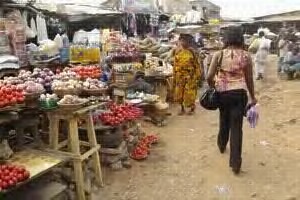A TYPICAL NIGERIAN LOCAL MARKET
The Nigerian local
markets are mostly for buying and selling perishable goods. However people
troop in from different places to buy fresh stuffs since markets are but few of
them. The different people who come to the market come for different purposes,
some are there to sell, some to buy and even some to steal and snatch people’s
belongings. In some cases the markets
are always filled up with people of different tribes and ethnic group as they
exchange goods and services, most times, more populated by the hausas with
their Gambari hat, which is synonymous with Hausas from the Northern part of
the country.
 The Hausa
people are the largest ethnic group in Nigeria. They are revered merchants and
savvy traders known for raising cattle and growing crops. So they are mostly found in the market
selling their food stuffs like onion, tomatoes, pepper and so many others. Even
in the market there are shops of those that sell food items, snacks, and a few
groceries for those who come to the market.
The Hausa
people are the largest ethnic group in Nigeria. They are revered merchants and
savvy traders known for raising cattle and growing crops. So they are mostly found in the market
selling their food stuffs like onion, tomatoes, pepper and so many others. Even
in the market there are shops of those that sell food items, snacks, and a few
groceries for those who come to the market.
In a typical local
market The major foodstuffs available
are fresh vegetables such as onions, tomatoes, pepper, vegetable oil, grains
and cereals such as rice, cow peas ("beans"), cassava flour and yam
flour.
For middle-class
housewives, processed and packaged products such as beverages, milk, canned
tomatoes are available at outdoor "stores" located close to the
markets. Small store owners often situate and display their wares close to
small markets to attract patronage of middle and high income Nigerians who can
afford to buy processed and packaged food items and beverages. More so, expatriates unfamiliar with the
intricacies of haggling in Nigerian markets often end up paying outrageously
high prices for minor items, for which reason the daily dream of the average
market woman is to have an expatriate buyer.
Apparently, the
market is where fresh foods are sold and so Nigerian buyers insist on fresh
meat, and the price depends on the quality of the cut and of course the buyer's
haggling power. Nothing goes to waste here. Practically every part of the
butchered animal goes for sale as table meat. The entrails (ifun), the legs
(bokoto) and hide (pomo) are cooked and eaten. Boiled hide (pomo) is a delicacy
in Nigeria and successive Nigerian governments have tried unsuccessfully to
convince Nigerians to spare cattle, goat and sheep skins and hide for the
leather export industry.
However, In
Nigeria, there are a number of markets that attract a large number of people
for various reasons. Some people go to these markets to purchase items because
of their relatively low prices while others prefer them for a quality shopping
experience. Take for instance a small scale retailer based in one of the
suburbs, he or she may visit these markets to purchase bulk items from
wholesalers in order to resell at lower prices at a more convenient time and
place.



No comments:
Post a Comment